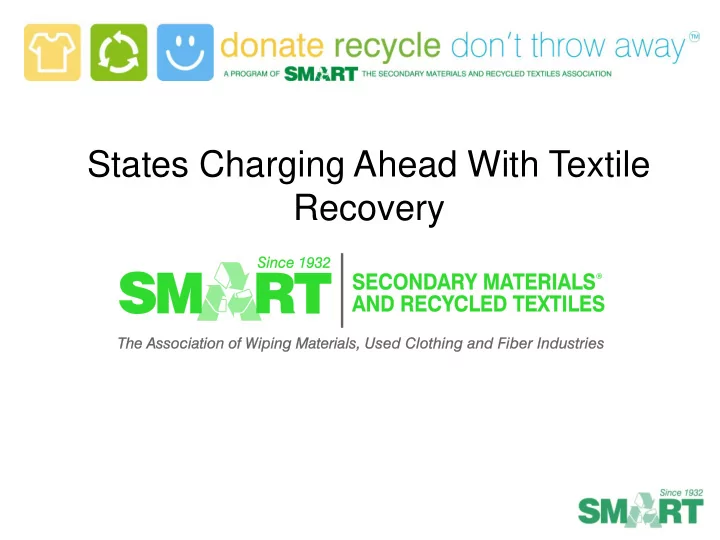

States Charging Ahead With Textile Recovery
Jackie King SMART Executive Director 443-640-1050 x105 jackie@kingmgmt.org www.SMARTasn.org January 6, 2016
Today’s Definition of Acceptable Textiles to be Recycled Any clothing, household textile or commercial linen textile as long as it is DRY and has NO ODOR can be reused and recycled.
Acceptable Items to Reuse/Recycle Include : Bedding: Jerseys (sports) Stuffed animals (comforters, sheets, Napkins (cloth) Suits pillow cases, blankets) Pajamas Sweaters Belts Pants Sweatpants Boots Pet beds & clothing Sweatshirts Bras Pillows Table linens Coats Purses Ties Curtains/Draperies Scarves Towels Dresses Shirts T-shirts Flip flops Shoes (single or in pairs) Undergarments Halloween costumes Shorts Hats Skirts Jackets Slippers Jeans Socks (single or in pairs)
Use of the Term “Recycling” Within the Textiles Industries The industry tends to use the words recycled and reused interchangeably. The clothing that is sold in charity thrift store and sold to developing nations would be considered “reuse” The textiles that are turned into wiping rags and the textiles that are ground up into fiber would be considered recycled.
Where Does Recycled Clothing Go? • 45% used for secondhand apparel • 30% become wiping and polishing cloths • 20% reprocessed into fibers • 5% is unusable
How Are Textiles Reuse & Recycling Industries Different Today? The industry (process) has not changed in hundreds of years. What has changed is the industry is becoming more transparent and now being recognized by both Charities and regulators as having a positive environmental impact as a recyclable and an economic sector.
SMART Background • SMART – what does it stand for? • Nonprofit trade association, established in 1932 • For Profit Used clothing, wiping material, fiber companies • Nearly 200 companies worldwide • Committed to “green” way of life
What do SMART Companies Do? • Pre-consumer market • Acquire byproduct from textile/fiber companies • Repurpose material for consumer products • Wiping cloths, insulation, home furnishings… • Post-consumer market • Acquire textiles from charity & commercial lines • Once graded, clothing is recycled • Some members collect used clothing and textiles using textile recycling bins
SMART’s Goals 1. Increase awareness of need to recover and recycle textiles 2. Increase supply of textiles in marketplace 3. Decrease the amount of clothing and textiles in landfills 4. Offer help and expertise to government in developing programs to promote textile recovery and help find recycling company partners 5. Reduce cost to municipalities by reducing tipping fees associated with textile waste disposal 6. Capture remaining 85% of textiles that are not being recycled – Donate, Recycle, Don’t Throw Away.
SMART Member Locator Listing of SMART Members on www.smartasn.org Searchable by Product Category, Company, State Available to Public
Recent SMART Initiatives - Legislative • Clothing Collection Bins in the Community - Clothing Collection Bin Operator Code of Conduct - Draft Ordinance Language and Bin Position Paper - Bin Committee of SMART members to work on proactive efforts in cities and towns - Municipality Outreach Document - Ongoing outreach to communities about benefits of textile recycling and need for reasonable regulations - 2015 – New York state passes bin legislation based on SMART Ordinance – signed into law December 2015
Council For Textile Recycling • Sister organization to SMART; 501c3 charitable org • Membership open to municipalities, states, government agencies at no charge • Goal is to educate public about textile recycling and to promote zero textile waste in landfills by 2037 • Members also include apparel manufacturers and retailers, charities, academics and textile recycling companies • www.weardonaterecycle.org
Recent SMART Initiatives - ReClothe NY • Partnership with NYSAR3 and CTR for first ever statewide textile recycling campaign - ReClothe NY launched in conjunction with America Recycles Day 2014 • Included PR toolkit for local recycling coordinators to use to conduct outreach to local media about program • Developed Operational Manual for Communities to use to help them launch events around campaign • Award Winning Program – 2015 EPA Environmental Champion Award – Region II
Recent SMART Initiatives - Mass DEP • Partnership with Mass DEP and CTR for textile recovery campaign - Stakeholder Meeting October 2015, Boston MA • Launch to take place in January 2016 • Events in 2016 to coordinate with Earth Day • Includes PR toolkit for local recycling coordinators to use to conduct outreach to local media about program • Operational Manual for Communities to use to help them launch events around campaign
How Can You Help? • Provide convenient collection points • Promote textile recycling days - Earth Day (April 22) - America Recycles Day (November 15) - End-of-the-Semester (partner with local colleges) • Include textile recycling in all public relations and promotion efforts supporting recycling programs • Help educate the recycling public about textile recycling • Encourage public agencies to use products made from recycled textiles
Future Smart Partnerships with States • SMART interested in partnering with more states • Need to have members in community to collect and support and help SMART provide resources needed to partner on campaign • Are there SMART members in the community? • Are SMART members able to present at meetings or can SMART provide staff to present? • Need to have all stakeholders engaged for program to work – charities, for profit, thrifts and government • Consensus from partners on messaging very important to SMART
Recommend
More recommend